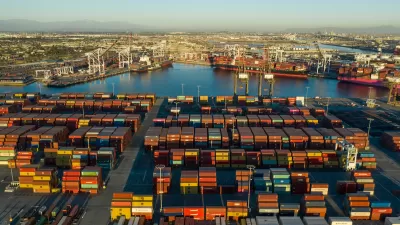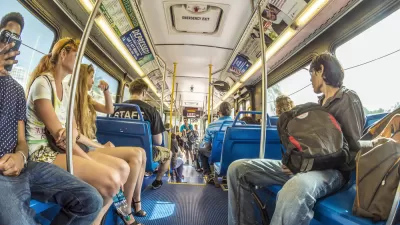Railroads are overcoming decades of resistance from environmentalists by touting their greener aspects.
"With fuel prices at record highs and worries about global warming reaching critical mass, U.S. companies of all stripes are touting their green credentials. That list includes plenty of businesses that wouldn't normally be associated with the environmental movement, like oil companies or mining outfits. But the juxtaposition for trains is among the starkest.
Early in the 20th century, steam-powered trains, fueled by coal, cast off trails of embers that often ignited and denuded the surrounding landscape. Train accidents and cargo spills still taint perceptions of railroad companies. Earlier this month, a Burlington Northern Santa Fe train partially derailed in Lafayette, La., and began leaking hydrochloric acid. Several thousand people were forced to evacuate. (Accidents involving trains carrying hazardous material have been declining slightly over the past decade, according to the U.S. Department of Transportation.)
Freight trains now use much cleaner and more fuel-efficient diesel engines, and railroad companies are testing new engines that the industry is touting as "ultralow-emission." Many environmentalists acknowledge that the railroads have a powerful argument, given that freight trains burn far less fuel than trucks and can help reduce highway congestion.
"In general, train transportation is much more fuel efficient than trucking, and we should be doing more of it," says Colin F. Peppard, transportation policy coordinator for Friends of the Earth, an environmental advocacy group."
FULL STORY: Railroads Roll With A Greener Approach

Coming Soon to Ohio: The Largest Agrivoltaic Farm in the US
The ambitious 6,000-acre project will combine an 800-watt solar farm with crop and livestock production.

Pennsylvania Mall Conversion Bill Passes House
If passed, the bill would promote the adaptive reuse of defunct commercial buildings.

U.S. Supreme Court: California's Impact Fees May Violate Takings Clause
A California property owner took El Dorado County to state court after paying a traffic impact fee he felt was exorbitant. He lost in trial court, appellate court, and the California Supreme Court denied review. Then the U.S. Supreme Court acted.

Dallas Surburb Bans New Airbnbs
Plano’s city council banned all new permits for short-term rentals as concerns about their impacts on housing costs grow.

Divvy Introduces E-Bike Charging Docks
New, circular docks let e-bikes charge at stations, eliminating the need for frequent battery swaps.

How Freeway Projects Impact Climate Resilience
In addition to displacement and public health impacts, highway expansions can also make communities less resilient to flooding and other climate-related disasters.
City of Costa Mesa
Licking County
Barrett Planning Group LLC
HUD's Office of Policy Development and Research
Mpact Transit + Community
HUD's Office of Policy Development and Research
Tufts University, Department of Urban and Environmental Policy & Planning
City of Universal City TX
ULI Northwest Arkansas
Urban Design for Planners 1: Software Tools
This six-course series explores essential urban design concepts using open source software and equips planners with the tools they need to participate fully in the urban design process.
Planning for Universal Design
Learn the tools for implementing Universal Design in planning regulations.

























